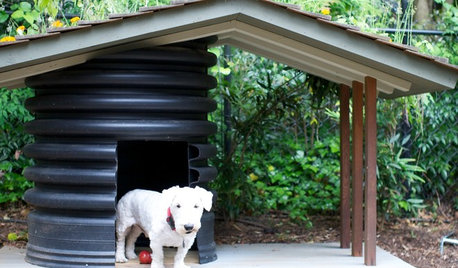raccoons in sweet corn and not afraid of electric fence
hannah9880
12 years ago
Related Stories

SUMMER FRUITS AND VEGETABLESHow to Grow Your Own Fresh, Sweet Corn
Here's how to plant and care for your own mini cornfield
Full Story
EDIBLE GARDENSHow to Grow Your Own Sweet Summer Crops
This guide will help any gardener get started on growing the freshest warm-season veggies and berries for summer
Full Story
LIFEHow to Outsmart Backyard Critters
Learn to think like a raccoon, skunk or squirrel to keep your home safe and your garden intact
Full Story
GARDENING AND LANDSCAPINGWorld of Design: 10 Home Gardeners Show Us Their Sweet Summer Harvests
From New York to Tokyo, these gardeners have turned their yards, terraces and rooftops into places of bounty
Full Story
FENCES AND GATES12 Delightfully Different Garden Walls and Fences
If pickets seem picked over and you shrink from chain link, try these full-of-personality fencing alternatives
Full Story
GARDENING GUIDES5 Invaluable Life Lessons From the Garden
The garden is both teacher and healer. Don't be afraid — dig in and reap the benefits
Full Story
EDIBLE GARDENSSummer Crop: How to Grow Blueberries
Plant blueberries in spring or fall for garden beauty through three seasons — and a sweet superfood in summer
Full Story
PETSHow to Help Your Dog Be a Good Neighbor
Good fences certainly help, but be sure to introduce your pup to the neighbors and check in from time to time
Full Story
GARDENING GUIDESBackyard Birds: How to Care for American Goldfinches
The American goldfinch is a bright-in-the-summer visitor and one of the only vegetarian songbirds. Here's how to give them a healthy habitat
Full StoryMore Discussions








fruitnut Z7 4500ft SW TX
grandad_2003
Related Professionals
Edmond Landscape Architects & Landscape Designers · Glassmanor Landscape Architects & Landscape Designers · Kenmore Landscape Architects & Landscape Designers · Sahuarita Landscape Architects & Landscape Designers · Mount Wilson Landscape Architects & Landscape Designers · Alexandria Landscape Contractors · Fort Hunt Landscape Contractors · Fort Wayne Landscape Contractors · Golden Gate Landscape Contractors · Mission Landscape Contractors · East Ridge Driveway Installation & Maintenance · Gages Lake Driveway Installation & Maintenance · Ramona Driveway Installation & Maintenance · Wildomar Driveway Installation & Maintenance · Lakewood Driveway Installation & Maintenancewayne_5 zone 6a Central Indiana
Joe1980
caroliniannjer
caroliniannjer
caroliniannjer
nygardener
wayne_5 zone 6a Central Indiana
glib
hannah9880Original Author
tokoloshe
caroliniannjer
glib
Beeone
hannah9880Original Author
jimcarey
BalrogVT
harveyhorses
zeedman Zone 5 Wisconsin